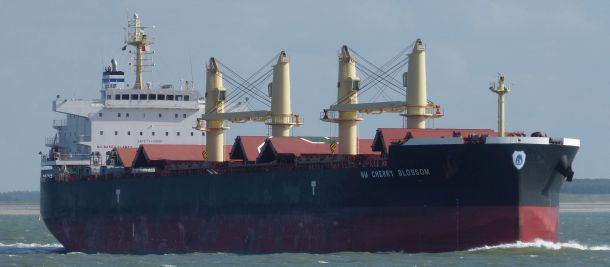Western Sahara has won its conflict cargo case in South Africa

The Moroccan state company OCP has decided to drop defending the detained conflict mineral cargo in South Africa. The Saharawi people thus won a 5 million USD walk-over victory before the trial over phosphate rock ownership even had begun.
Published 13 July 2017
On 1 May 2017, the bulk vessel NM Cherry Blossom was detained in Port Elizabeth, on a stop-over to New Zealand. The vessel contained 55.000 tonnes of phosphate rock from occupied Western Sahara.
The UN has concluded that any exploitation of resources in Western Sahara would be illegal if the Saharawi people do not consent to it. Similarly, the Court of Justice of the EU on 21 December 2016 judged that trading with the territory would be illegal without such consent. However, Morocco, illegally occupying parts of Western Sahara since 1975, has kept the exports of Western Sahara phosphate rock. In 2016, Morocco earned over 200 million USD from the rock export from the territory.
The second biggest importing country is New Zealand, where two farmer co-operatives import from the occupied territory.
On 15 June, the High Court in South Africa judged that the case would proceed to a trial. Read the comprehensive judgment of 15 June here. The court concluded that the case would proceed to a trial to conclude on the ownership of the cargo.
However, OCP, which had defended its apparent rights to the cargo during the process, on 13 July 2017 declared that it would no longer proceed with the matter. It thus considers the 5 million USD worth of cargo lost. The value equals around 15% of the entire multilateral humanitarian aid donated to the refugees from Western Sahara, which fled following the brutal Moroccan occupation. OCP today issued a text on its exit from the trial.
"The fact that Morocco has stepped down shows how weak cards they hold. Based on development of international law, Morocco has no legal right to exploit the territory it holds under occupation. It surely had no interest in allowing its political arguments be tested by an independent court", stated Davide Contini of Western Sahara Resource Watch.
"It is a remarkable step for the people of the territory, and hopefully this could be a first step of seeing a halt to the dirty exports. No phosphate export should take place from the territory as long as Saharawis are prevented from expressing their consent as required by the International Law. We hope this also sends a signal to the importers in New Zealand and elsewhere. It should source its phosphates from lands which are not stolen", stated Contini.
The large bulk vessel has now been detained for 73 days. Since 1 May, only one vessel of phosphate rock has left occupied Western Sahara, the Common Spirit, which arrived New Zealand this week.
It is not immediately clear to Western Sahara Resource Watch what will now happen to the vessel and the cargo next.
Read more about the court case in our report 'Carriers of Conflict', published 16 June.
News
Dirty green energy on occupied land
How can it be wrong to develop renewable energy, in a world that is in desperate need for a green transition? In Western Sahara, the problems are numerous.
22 April 2024
EU Court adviser confirms separate and distinct status of Western Sahara
The Advocate General of the EU’s top Court backs the legal status of the people of Western Sahara. Final Judgment expected in a few months.
21 March 2024
EU Court adviser: fruit from Western Sahara should not be labelled as from Morocco
Labelling those products as originating in the Kingdom of Morocco instead of originating in Western Sahara breaches EU law, the Advocate General of the EU Court of Justice concludes.
21 March 2024
COWI abandons future projects in Western Sahara
After undertaking work for the Moroccan state phosphate company in Western Sahara, the Danish consultancy giant COWI states that it “will not engage in further projects" in the occupied territory.
11 March 2024



